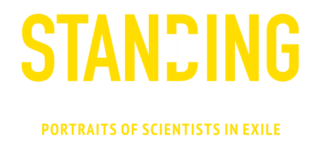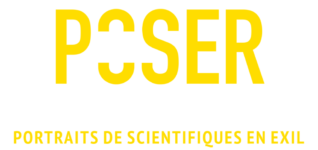From a research project to the exhibition
From a research project to the exhibition
Focus sur l’exil scientifique forcé hier et aujourd’hui (RESTRICA)
“This project, lying on the margins of academic research and art, is the result of a collaboration between Pascale Laborier and Pierre-Jérôme Adjedj. It stems from their dialogue on the representation of scholar exiles and drew on the contribu- tions of the people photographed.”
The exhibition “Standing for Freedom”
Présented by Pascale Laborier (curator)

“The “in-between” is now the new country: the country of exile where the exiles of yesterday and today meet. It is the path of solitude in solidarity that I have taken. Solidarity is my new family.”
Where am I from? I can’t honestly answer that. In my position as a host, I refuse to think in these terms. For me, fraternity is the cardinal value of human relations.
Until recently, Venezuelan science was renowned for its openness and excellence. Today, all that is collapsing along with the freedom of thought.
Staying in my country became impossible. With difficulty, I went to France where I fulfilled my dream in the incredible field of research that transcends borders and nationalities.
Without really being aware of it, the memory of the Chilean exile has always been present since I was a child, but my father’s personal history has long been – and still is – told to me in bits and pieces.
Burundi having become a hostile research ground totally inaccessible to me, I was forced to abandon it and go into exile in France.
Making the decision to leave, seeking a better horizon, making exile an action. During this period, the learning never stops. I learned to be resilient, to develop this capacity to adapt.
Making the decision to leave, seeking a better horizon, making exile an action. During this period, the learning never stops. I learned to be resilient, to develop this capacity to adapt.
I am no longer an endangered academic; I am one of thousands of precarious academics in the European academic labour market. Political oppression is not the only way to limit academic freedom.
In 2015, I helped draft a memorandum to the international community and the Congolese presidency. My participation in this lawyers’ collective was enough to make me an opponent.
It is essential to protect the knowledge carriers on the ground, even before the extreme conditions that cause exile occur.
I was a candidate against the dictatorship, which led to an assassination attempt and the kidnapping of my wife. When they heard the news, the students decided to defy the dictatorship by erecting a makeshift traffic circle in my name.
Taking part in the reception is a heavy responsibility, I try to do my part. In doing so, we are attempting to affirm the importance of global solidarity in addressing serious violations of political, academic and speech freedom.
We are all actors of the freedom to think, to act and to practice our profession.
In 1993, I freely decided to come to France to study. Twenty-seven years later, I came back, but under pressure. This time it’s a single ticket. Venezuela, the country where I was born, is no longer a country, it is a nightmare.
Making the decision to leave, seeking a better horizon, making exile an action. During this period, the learning never stops. I learned to be resilient, to develop this capacity to adapt.
Fear is the trigger that forces the researcher to flee. It jeopardises the researcher’s life, but also his or her scientific work and productions. No one chooses the road of exile for pleasure.
I wanted to live, to live without fear of dying, to think about other things, to write, to read, to do research. This was no longer possible.
This journey of exile has enriched our experiences, but without a collective and synergistic commitment between the host and home countries, no development cooperation project can be viable and effective.
In 2015, Aleppo was ranked the most dangerous city in the world. There was only one option: “to leave”. Thanks to my studies in Grenoble, I regained hope by realising my dream of working in scientific research.
I left Turkey by sea with this little waterproof bag. It is fascinating and pitiful to see how a man’s life can fit into something so small.
Today, being a woman or a Christian is no longer a problem for my career but I have another difficulty, that of being a foreigner.
On this picture are superposed an interior and exterior view of the Paris Observatory building. It reminds us of realities common to all humanity, starting with the Sun and the Moon.
At a time when the situation in Turkey had become seriously tense, particularly for the academics who had signed the “Academics for Peace” petition, the PAUSE programme enabled us to extend the brief welcome that a Turkish researcher had received.
I crossed the border between Syria and Turkey to escape tyranny. Then, as a free man, I carried my passport and my diplomas while observing the sky, I let the stars take me on a journey.
As intellectual actors, the issue of exile and more specifically of researchers in exile obliges us. I have seen the importance of the language issue, which is often painful for these researchers in danger.
I have suffered physical torture, psychological pressure, geographical distance… but I have also experienced resistance to this terrible situation.
It is more necessary than ever to continue to welcome those who, pursued for their ideas or prevented from practising by war and disaster, hope to find a human and scientific welcome in France.
The image of the exile becomes a trace and substitutes the presence of the thing for the place of absence. The image opens the space of reconciliation between the political memory of the place of exile and resistance in an imaginary place that restores it.
I am lucky enough to be one of the “hosts” with a keen awareness that today’s hosts may be tomorrow’s guests, as illustrated by the beautiful word “host” which blurs the distinction between the two.
Each of these encounters has given me a clearer awareness of the fragility of values which, far too often, only seem to be under threat in distant places.
I left Syria because of the civil war in 2011. I was a professor at the Faculty of Mechanical Engineering at Aleppo University. This dirty war devastated my country.
I left Syria because of the civil war in 2011. I was a professor at the Faculty of Mechanical Engineering at Aleppo University. This dirty war devastated my country.
Working on issues like mine leads to forced displacement. Many die on the road, in prison or are killed. I am neither happy nor unhappy to have been the ‘lucky one’ in this crowd of lost and forgotten.
As a teacher-researcher, I am well placed to help researchers in danger… So why not do it? It is the general principle of solidarity.
En tant qu’enseignant-chercheur, je suis bien placé pour aider les chercheurs et chercheuses en danger… As a teacher-researcher, I dreamed of working for my country. Although I miss my country, intolerance and serious human rights violations prevent me from returning.
The legal framework is deficient at the international level. There is still no specific protection for researchers in exile.
I am determined to carry out my research but my soul is still troubled by the loss of my loved ones to the Chinese government.
I experienced migration very early on, when I was just a child. I got used to not being dependent, to starting from scratch.
Working on issues like mine leads to forced displacement. Many die on the road, in prison or are killed. I am neither happy nor unhappy to have been the ‘lucky one’ in this crowd of lost and forgotten.
Like so many other people from regions opposed to the regime, we suffered terrible treatment. Today, as a doctoral student in Orléans, I have regained hope and wish the same for all researchers in danger.
the Authors
the Authors
Exhibition tour
Hosting the Exhibition
The exhibition “Poser pour la liberté” was designed and curated by Pascale Laborier and built by the Saint-Etienne Cité du Design. It is portable, to be seen throughout Europe. Hosting the exhibition means offering the possibility to animate the debate on the matter of scientific exile.
The special issue of the journal Hommes et Migrations focusing on the exhibition contains some forty portraits and testimonies, as well as other texts that will let you know more about the exhibition. It will be sent to you upon request. As part of the hosting, we will provide you with copies of the magazine (English translation available soon): the sale benefits a solidarity fund managed by the PAUSE program, a partner of the project.



